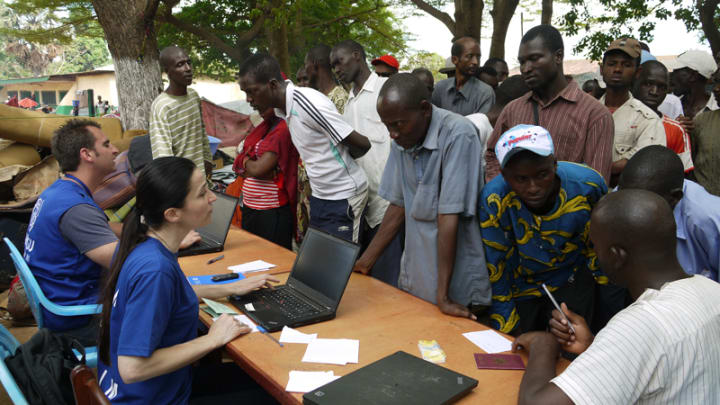
JUBA, South Sudan — According to the U.N.’s International Organization for Migration, which was one of the first bodies to develop its own internal data protection policy, the No. 1 principle when collecting data is its lawful and fair collection. This means aid agencies and aid workers, among others, have a responsibility to research international standards and national data protection legislation in the country of operation.
Additionally, before beginning any data collection efforts, it’s important to be clear on what information is needed and to ensure data can be collected or synthesized in an ethical and accurate way, said Katie Rickard, global coordinator for humanitarian research initiative REACH, which regularly operates in South Sudan.
Humanitarian organizations push evidence-based response in South Sudan
The humanitarian response has made strides in collecting and using data. But more digestible reports and streamlined data sets are just two items on a long list of areas to improve, aid workers tell Devex.
“Too many times data collection efforts start without a clear sense of the specific objective and without full confidence the data collected will be accurately reflecting the views and reality of the population of interest,” Rickard said. The populations researched are often extremely vulnerable and it’s unethical to take their time without a clear sense of the purpose, she added.
In South Sudan, where the humanitarian situation is dire and the gap between the demand and resources is wide, aid groups have started pushing for a more evidence-based response, trying to use data and information to better understand the context and make decisions in a calculated way. Here’s what IOM, REACH, and other experts say are the ingredients for successful collection and use of data in humanitarian settings.
1. Ensure a practical link
In a humanitarian context, data should never be collected for the sake of collecting it, said Rickard of REACH. Instead, it should inform operational, programmatic, or strategic decision-makers on an existing information gap, she noted.
In order for REACH to get the most out of each assessment, whenever possible the team tries to achieve more than one objective for decision-makers. For example, in March 2018, the organization was piloting a new methodology to assess the level of needs related to water, sanitation, and hygiene in South Sudan. It selected the town of Pibor because there had been water and food shortages in the area. The assessment included indicators to measure the severity of the situation, and the findings then informed both the Famine Early Warning Systems Network, a provider of early warning and analysis on food insecurity, and South Sudan Needs Analysis Working Group, which in turn recommended a response to scale up services in that area.
2. Do no harm
The protection and privacy risks of those being surveyed must be at the heart of your assessment so you’re not putting populations at risk, Rickard said. Collecting personal identifiers, such as names, telephone numbers, and GPS points can put the person interviewed in jeopardy of being targeted by armed groups or of people misusing their personal information.
Individuals should be offered the right to privacy and dignity — and this principle should be kept top of mind when designing survey tools and data protection and sharing practices. For example, REACH only shares anonymized datasets to ensure no personal identifiers of people interviewed are released.
3. Make yourself familiar with data protection principles
In order to respect the right to privacy, human dignity, and well-being and to ensure safety and nondiscrimination, aid actors have to understand basic protection principles, said a spokesperson for IOM’s Displacement Tracking Matrix, a department that collects data on displacement and migration.
If not, this could result in personal information such as the identification and whereabouts of vulnerable people falling into the hands of those who may intentionally or unintentionally cause them harm. Organizations have a responsibility to ensure that strong data protection principles and mechanisms are in place, he said. This means implementing data protection systems so that personal data is not misused and checking that memorandum of understandings or data sharing agreements are clearly understood. These agreements lay out the humanitarian purpose of the data to ensure it is not used for anything else and provide ways for people to withdraw their consent if they change their minds.
4. Be clear on objective and purpose
Know why you’re researching what you are and choose the methodology based on that — not the other way around. You need to know what the information gap is, what you’re trying to find out, and what the purpose is, which altogether informs how you go about it, said Rickard of REACH.
It is tempting when conducting data collection to try and answer all of the questions one might have, but this can lead to extremely long surveys, which take more than two hours to complete. No one in South Sudan or elsewhere can remain focused and concentrated for such a long period and provide thoughtful and accurate answers, Rickard said. The shorter the questionnaire, the more likely the answers that have been given are correct and the more people will feel that their time is respected.
5. Check what data is already available
Q&A: Degan Ali on the systemic racism impacting humanitarian responses
Adeso Executive Director Degan Ali says the localization agenda is being prevented by "racism that operates in the humanitarian system."
Are you using existing data to the greatest degree? Before new data is collected, ask if secondary data is available and whether historical lessons are being learned and used to build a picture of the situation, said a data expert who recently consulted in South Sudan and wished to remain anonymous.
6. Agree on indicators
Agreements on indicators and tools allows for comparisons across organizations, said a spokesperson for IOM’s Displacement Tracking Matrix. For example, REACH and DTM collect data on migration flows in South Sudan and work closely together to ensure complementarity of these activities. And in order to collect information on potential return movements after last year’s peace agreement, both organizations sat together and decided to start asking travelers about their refugee registration status in the countries neighboring South Sudan.
7. Be transparent and ensure quality
Be transparent about the methodology, including the limitations of what you’re measuring and what your data means in the context. This includes having data quality checks in place. After all, the higher the quality, the better the chances that your data will be used to inform decisions, said Rickard of REACH.
Practically this means checking the data collected on a daily basis, reviewing for common sense errors, and being willing to delete poor quality data. REACH has introduced both in-country and global checks. Before any analysis is released to the public, a team in Geneva reviews every dataset to ensure the analysis and calculations are correct.
8. Streamline assessments
As much as possible, streamline data collection and analysis to ensure comparability, quality, and compatibility between assessments. This will help ensure there is a shared understanding of the needs and situation and help reduce assessment fatigue, said Rickard of REACH.
9. Diversify data sources
Ensure that a range of data is being used, not just humanitarian data, but also data collected for conflict analysis and by academics and think tanks, said the data expert who consulted in South Sudan.




